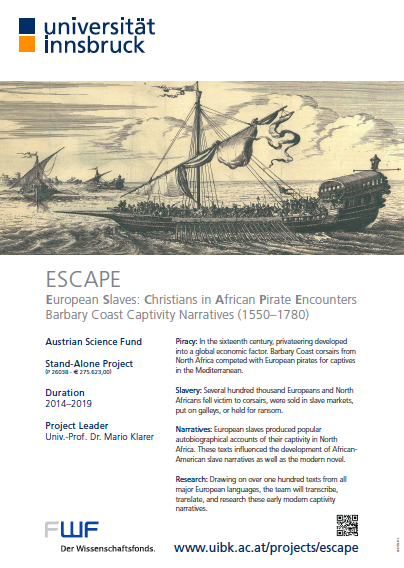Conferences
Piracy and Captivity in the Mediterranean: 1530-1810
Barbary Coast Captivity Narratives
16 - 18 June 2016
University of Innsbruck, Austria, Europe
New: German article about our conference
Program
Full Program as PDF File (includes Abstracts)
Flyer as PDF File
Accomodation
Call for Papers
(as PDF)
Usually, Africa is not the first continent that comes to mind when one reads about white slavery or narratives by European captives. Yet, captivity accounts by Christian slaves in Northern Africa, or the Barbary Coast, influenced early modern writers and public figures, such as Miguel de Cervantes, Daniel Defoe, Benjamin Franklin, or Thomas Jefferson. A large number of European and American Christians were slaves in the North African city-states of Algiers, Tripoli, Tunis, and Salé from the early16th to the early 19th century. Some of the slaves, who managed to escape or were ransomed, wrote narratives about their time in captivity after their return to their home countries.
Besides recounting the experiences and adventures of their protagonists, these Barbary Coast captivity narratives touch upon matters such as acculturation, the cultural and ethnic melting pot of the Barbary Coast, inter-Christian relations, the Islamic faith, as well as issues of gender, sexuality, and homecoming. Although many authors vilify Barbary Coast slavery, they often provide surprisingly balanced and positive evaluations of the Islamic religion and culture. As one of the most accessible sources of information on Islam and North Africa in the early modern period, these texts were tremendously popular and had a significant influence on the literature, art, politics, philosophy, and foreign politics of the countries subjected to the pirates’ attacks. The pirate activity was not only directed against countries located around the Mediterranean Sea but also affected German speaking countries, Great Britain, Scandinavia, the United States of America, or even far away islands as, for example, Iceland.
Until some years ago, interest in Barbary Coast captivity narratives was largely historical, as documents on slavery and piracy. The aim of this conference is to look at these narratives in a variety of languages from a literary perspective, while putting them into a proper historical, cultural context. Although the narratives as such stand at the center of the conference, we also invite papers that address larger issues pertinent to the production and reception of these texts. Besides literary scholars in the different philologies, we also especially welcome scholars from the fields of history, cultural studies, philosophy, theology, Islamic and Oriental studies, slavery studies, etc. Paper topics may include, but are not limited to, the following areas of inquiry:
Barbary Coast captivity narratives proper:
- the tension between fictionality and authenticity
- narratological features
- questions of cultural identity
- influences on the early novel and African American slave narratives
- the tension between Protestantism and Catholicism
- Muslim narratives of captivity in Europe
Barbary Coast slavery and piracy in general:
- diplomatic relations between North Africa and the Christian World
- piracy, politics, and economy on the Barbary Coast
- the role of the Barbary Coast in the development in the emerging United States
- Muslim perspectives on piracy and captivity
- the Trinitarians and other religious orders
- redemption practices
- Muslim slaves in Europe
- white slavery
Conference Participation
Please send conference paper titles with abstracts of about 300 words as a Word document to tobias.auboeck@uibk.ac.at. The deadline for submission is 30 November 2015.
November 13 - 14, 2014 we held a conference on "Perspectives on Northern Africa in the Early Modern Period: Piracy, Slavery, and Diplomacy" at Innsbruck. Speakers were Khalid Bekkaoui, Carsten Junker, Magnus Ressel, Joachim Oestlund, Elisabeth Watzka-Pauli, and Gillian Weiss.



